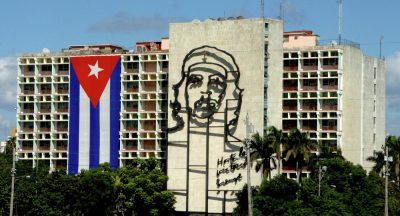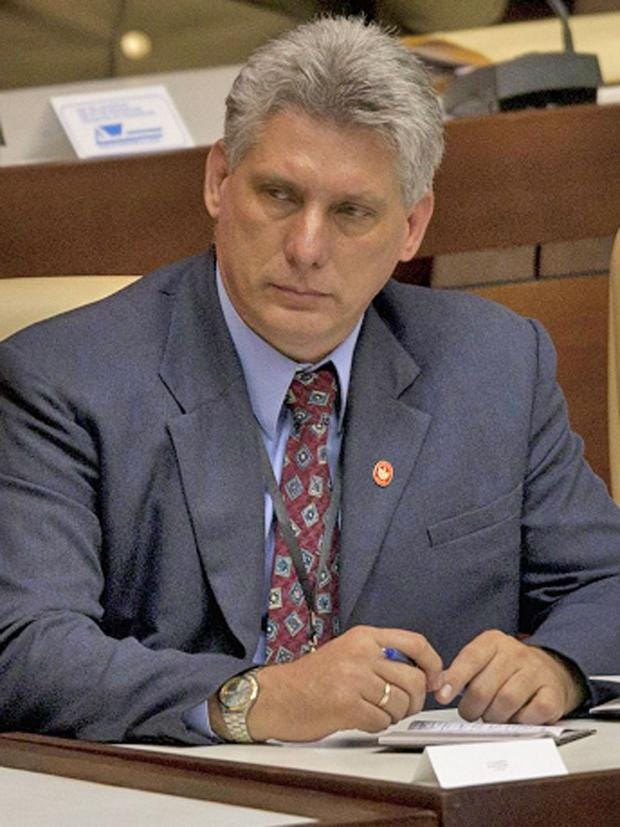May Day in Havana. Enthusiasm and Expectations

May Day in Havana is calm and festive. Walking through quiet, crowded streets, under a full moon, we try to be near the Plaza when the anthem plays at 7.30am. Foreigners say: “Only in Cuba … Wouldn’t miss it.“ Across the island, almost half the country’s population turns out. Newspapers say numbers are more than usual in support of the country’s new direction. It is not clear yet whether it is new.
My friend’s son, 33, complains that the new leader, Miguel Díaz-Canel (image below), has not defined a vision. He expects vision. Where I live, no one expects vision from politicians. Politicians manage. They respond to interests. Or not. My friend’s son takes it for granted that leaders lead.

Fidel led. It’s why millions still march in Havana at May Day. Twenty-five years ago, the world’s major media said Cuba could not survive more than a few months without the USSR. They ridiculed Cuba chuckling self-righteously as they showed farmers plowing with mules, and people waiting in lines for buses that didn’t come. The situation was indeed terrible.
So why is there a May Day event in Havana in 2018? It should be a question.
The recent Netflix documentary Cuba and the Cameraman shows how awful was the “special period” of the nineties. The footage is raw. It holds back nothing. True, many Cubans left. But many stayed. They’re still there, and their kids expect leadership from leaders.
Expectations determine what knowledge we pursue, and even what we see in front of us. What’s not expected is not asked about. It doesn’t get explained, and so we don’t learn, and don’t know we could.
It is a matter of mind/body connection. As you act in a certain way, you acquire expectations. They arise from lived experience. They determine what you see and what you demand explanations for. The point is well-known in analytic philosophy of science.
Philosophers in the North Atlantic pay lip service to mind/body connection. But we teach philosophy as if it doesn’t depend upon how we live and who we are, as persons. We teach it as an intellectual game: useless for practical purposes.
And yet it has practical purpose. The answer to the question, why did Cuba survive, is, in part at least, philosophical vision. Fidel provided it, continually. Such vision motivates. It tells us who we are, creating expectations, which direct understanding, giving rise, occasionally, to capacities.
Marx called it “species essence”. He said individual thinking depends upon it. Our understanding of it, though, can be wrong. Then, when we try to live well, humanly, we get frustrated, or worse.
That’s why José Martí, and his early nineteenth century predecessors, thought philosophy was crucial for Latin American independence. They weren’t idealists. They just knew about expectations. They knew the dehumanizing expectations of imperialism. They opposed them, quietly, persistently, philosophically, over centuries.
“They” includes Juan Marinello. He was born on a slave plantation in 1902. His father owned it. Marinello became a professor, writing some of the most beautiful academic prose in the Spanish language, according to scholars. 1 By 1938, he was leader of the United Revolutionary party, a wing of the Cuban Communist Party.
Marinello wrote “essays of enthusiasm”. He didn’t add long lists of notes or make complicated arguments. He used metaphors. His essays express expectations, creating confidence, directing enquiry. In 1948, in a famous speech, “Youth and Old Age”, he said Cuba had no youth. Cuba’s youth, Marinello argued, were old, because youth is a time of sacrifice and vision. Marinello expected vision.
He expected intellectuals to resist the “gloomy house of customers and listless motivation of career jumping”. 2 They were dark times. US ideological power was suffocating, as it remains. And yet academics spent their time making long arguments, with endless footnotes, avoiding, or ignorant of, the crucial question: species essence.
Marinello expected intellectuals to be – metaphorically! – youth, motivated by vision and not by livelihood dependent on the dominant class and imperialism.
Tired lefties say Cuban youth will succumb to the appeal of capitalism. They’ve been saying it for sixty years. They forget that Cuban youth have expectations, like Marinello had expectations.
They miss the point of enthusiasm. If there are some who have it, the example is there. And others can try. They gain expectations that make knowledge possible, because they make questions possible. And they gain capacities.
One of the first things that impressed me about Cuba were expectations. These people expected a better society. Cuba was devastated in the early nineties. Yet skinny professors at the University of Havana were out recording birthweights to know the effects of smoking on infant mortality. There were no lights, no gas to cook, no pens, but they worked to reduce the infant mortality rate.
They succeeded. Cuba’s infant mortality rate fell to below 10 during the “special period” of economic crisis when Cubans said the sun had stopped shining on their island.
The question, why did Cuba survive, is not asked in the North because we don’t expect the reality that the answer explains. It’s a reason to know Mayday in Havana.
Martí said freedom is the ability to think without hypocrisy. That is, it is the ability to think as one lives, or to live what one professes. Because if you can’t live what you profess, you also can’t learn about it. You can’t discover. You don’t expect to, and as a result can’t ask the proper questions.
It is more interesting and challenging than constructing long arguments that leave no distinction unexamined.
Ana Belén Montes had the freedom Martí described. She’s in jail in the US, suffering harsh conditions, having hurt no person. Please sign petition here.
*
Prof. Susan Babbitt teaches philosophy at Queen’s University, Kingston Ont. She is author of Humanism and Embodiment (Bloomsbury 2014). She is a frequent contributor to Global Research.
Notes
1. José Antonio Portuondo, “Prólogo”, Juan Marinello, Cuba: Cultura, Havana, 1989, xx
2. Ramiro Maetzu, cited in Marinello, “Joventud y Vejez” Cuba: Cultura, 199
3. http://www.prolibertad.org/ana-belen-montes. For more information, write to [email protected] or [email protected]

